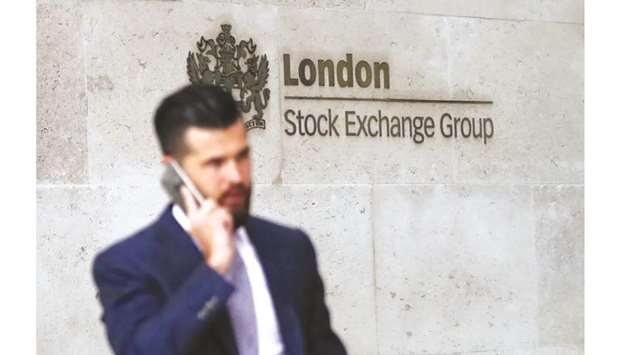Global stock markets rallied yesterday, with Wall Street in record territory, after President Donald Trump said that a trade deal with China was close, emboldening investors to take fresh positions.
In Europe, London’s FTSE 100 jumped 1% to 7,287.00 points, Frankfurt’s DAX 30 was up 0.6% to 13,221.64 points and Paris’s CAC 40 gained 0.4% to 5,884.26 points at the close yesterday.
The British pound, meanwhile, dipped as Britons voted in a general election that seeks to determine the future of Brexit.
The world’s top two economies have been locked in a trade war with negotiators working to reach at least a partial resolution – called a phase-one deal – before Washington is scheduled to increase tariffs on Sunday.
Anxiety had been building up ahead of the deadline and so relief was palpable across trading floors after Trump’s tweet.
“The Santa rally is coming early as President Trump signalled US negotiators are getting very close to a big deal with China,” said Edward Moya at OANDA, adding that Trump’s tweet “was more optimistic than usual”. The dollar powered ahead, as did oil amid hopes that a trade deal would help the global economy.
US Treasury bonds fell as investors moved money back into riskier assets.
The British currency traded weaker throughout election day in the UK, having spiked overnight to a 10-month peak at $1.3229 on expectations of an election win for Prime Minister Boris Johnson’s Conservative Party.
The pound dipped yesterday as Britons voted in a general election that seeks to determine the future of Brexit.
Having spiked overnight to a 10-month peak at $1.3229 on expectations of an election win for Prime Minister Boris Johnson’s Conservative Party, the pound slipped.
Johnson called yesterday’s snap vote in a bid to gain a decisive mandate to leave the European Union on January 31, more than three-and-a-half years after Britain narrowly voted in a referendum to leave.
“Just before voting opened, the polls suggested that a Conservative majority – seen as the preferred market outcome... was perceived as increasingly likely,” noted AJ Bell investment director Russ Mould.
However investors were sitting tight awaiting the vote outcome as polls have tightened in recent days, suggesting that a hung parliament, or no overall majority for either the Tories or main opposition Labour party, could still occur.
Wall Street equities got off to a weaker start as American producer prices and jobless claims suggested “some weakness creeping into the US economy”, said Edward Moya at OANDA, adding however that the state of trade talks is the main factor fraying stock investors’ nerves.
Anxiety is deepening ahead of a Sunday deadline for fresh US tariffs on Chinese goods and no sign yet that they will be delayed.
Johnson called yesterday’s snap vote in a bid to gain a decisive mandate to leave the European Union on January 31, more than three-and-a-half years after Britain narrowly voted in a referendum to leave.
“Just before voting opened, the polls suggested that a Conservative majority – seen as the preferred market outcome... was perceived as increasingly likely,” noted AJ Bell investment director Russ Mould.
However investors were nervous awaiting the vote outcome as polls have tightened in recent days, suggesting that a hung parliament, or no overall majority for either the Tories or main opposition Labour party, could still occur.
The ECB, meanwhile, gave markets little to trade on as Christine Lagarde chaired her first monetary policy council meeting and subsequent news conference.
The bank left interest rates unchanged and a maintained its massive bond-buying programme, as expected.
ECB economists also came up with figures suggesting both an uptick in inflation and “signs of stabilisation in the growth slowdown”, which provided the euro with some tailwind.
Lagarde said she would develop her own style and claimed to be neither dovish nor hawkish but aimed to be a “wise owl”. Still, Lagarde “came off as slightly hawkish”, said OANDA’s Moya. “Lagarde seems poised to help take the eurozone out of negative rates,” he said.
Earlier yesterday in Asia, equity markets mostly closed higher after the Federal Reserve indicated it was unlikely to change US interest rates throughout next year.
The central bank, which has cut borrowing costs three times this year, said after a two-day meeting it would hold them for now and set its sights on low inflation and the global economy.

A commuter walks past the London Stock Exchange building. The FTSE 100 jumped 1% to 7,287.00 points yesterday.
